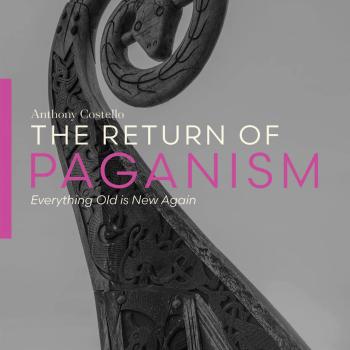I hate to be the guy who points this out, but we need to do some semantic housekeeping in the Church. I won’t name names, but we have to acknowledge we are living in a culture of “memes” and that this is a legitimate problem. It is a culture where vacuous, silly and just plain dumb things get said and then passed along without much thought, usually because somebody famous said them. As the Church, the community on earth that should be most dedicated to the clear articulation of truth, we really must do a better job at saying what we mean, and meaning what we say. I know this is hard given our cultural moment and the technology we use. But we, myself included, have to be more careful about the claims we make. That said, here are 5 statements we often hear in our churches, or from our Christian “thought leaders” that we either need to stop saying, or do a better job of qualifying when we say them.
Dumb Thing #1: “Hey look, I get attacked from both the Right and the Left” (therefore, I must be correct)
The first part of this sentence is not necessarily the dumb part. It could be true that a particular pastor or Christian leader gets attacked from both those to the theological or political right as well as the theological or political left. What is dumb is the implied premise: that if you are getting attacked “from both sides” your claim is therefore somehow correct. That is just a logical fallacy: a non-sequitur known as the argument to moderation. Yet we hear pastors or Christian public intellectuals often lead-in with some kind of statement like this. I guess if we hear this statement, we are supposed to assume that what follows is somehow true, or, at least, more true than the claims being made by those who disagree with said speaker.
A version of this vacuous claim is that Jesus Himself came to do just this: find the golden mean between warring theological or political factions. While there may be a golden mean in the pursuit of virtue, a valid Aristotelian concept, Jesus nowhere suggests there is something special about being in the middle of two opposing factions. As if simply being in the middle means you are right. Jesus, being the author of Logic (well, at least according to Descartes) would not have made such a blatant logical error. Furthermore, Jesus makes it crystal clear that His very presence and mission are meant to divide, not to bring together:
34 “Do not think that I have come to bring peace to the earth. I have not come to bring peace, but a sword. 35 For I have come to set a man against his father, and a daughter against her mother, and a daughter-in-law against her mother-in-law. 36 And a person’s enemies will be those of his own household. 37 Whoever loves father or mother more than me is not worthy of me, and whoever loves son or daughter more than me is not worthy of me. 38 And whoever does not take his cross and follow me is not worthy of me. 39 Whoever finds his life will lose it, and whoever loses his life for my sake will find it.
Matt 10:34-39
While moderation may be the key in many areas of life, being “in the middle” between two groups in itself says nothing about whether what one is saying is right or wrong. Finally, it may even be the case that you are getting attacked from those on the Right and the Left of an issue simply because your view is that terrible. It may be that literally no one, not even warring factions, can believe it and that is why they are both after you.
Dumb Thing #2 “The Real Problem in the Church is We Just Need To Love More”
The problem here is not that this statement is false. The problem is it is vague to the point of being absolutely useless. The whole reason we come to Church is to learn what it means to love! Thus, to simply repeat ad nauseam “we just need to love more,” or to constantly condemn a congregation for “being unloving” is a clear case of putting the cart in front of the horse (like miles in front of it). We already know we don’t love enough. Now what!?
The job of the Bible teacher, the artist formerly known as “pastor,” has to be to demonstrate what love is: both in its theological abstraction and practical, day-to-day application. “What does a biblically-inspired morality look like, and how do we fulfill it?” is a much more worthwhile topic of prayerful reflection and sermonic articulation than ambiguous charges about not loving enough. A look at specific biblical virtues, like (gasp!) modesty or patience, and how one can display them is not only a more interesting thing to talk about, but it puts actual meat on the bones of our Christian walk. Everything else is just vacuous fluff.
Dumb Thing #3 “We should have women pastors because, after all, it was women who discovered the empty tomb”
I’ve heard prominent pastors and even serious theologians use this one. While I do not have a particularly strong position on the egalitarian versus complementarian debate within the church (although I certainly lean complementarian), this claim is a total non-sequitur. What does the women finding Jesus’ empty tomb have to do with the structure and functioning of the Church? Answer: nothing.
There may be good arguments for women pastors, uh, I mean “Bible teachers,” but clearly this cannot be one of them. The fact that it was women who found the risen Lord certainly speaks to the character of those women. It also says something about the Apostles’ character. But it says nothing about the future structure of the Church or the roles of men and women within it. For one of the most egregious misuses of this claim (and some basic rebuttals), see here, and here and here.
Dumb Thing #4 “(Illegal) Immigrants are Made in the Image and Likeness of God too!”
Can you say “strawman?” This one is, admittedly, far more political than the previous three statements. However, pastors will often say something like this in or around election cycles. The idea here is either to use this vacuous claim a) to reprimand one’s congregation or b) to distance oneself from complex political issues. Usually it is made by left-leaning pastors or “thought” leaders as a not-so-subtle attack on Christians concerned about a porous southern border. Or, sometimes, it is said by more right-leaning pastors who hold more reasonable beliefs about immigration to reemphasize the obvious. In doing so, they shield themselves from the character assassination that inevitably results from having such reasonable beliefs.
The obvious problem with this statement is that no one, LITERALLY NO ONE, disbelieves it. Thus, it is a purely rhetorical statement– a piece of shameless propaganda. As such, it shouldn’t be made from the pulpit. To do so is to not-so-subtley accuse your entire congregation of something like racism. Of course, in our era of faux social justice activism, this type of accusation has become quite commonplace, as demonstrated here. Rather than listening to such drivel, one could instead listen to an actual biblical exegesis on the thorny issue of immigration, like this one here.

Dumb Thing #5 “LGBTQ+ Are the Most Vulnerable Members of Our Community (and need special help)”
This one also touches on a hot-button, political issue. However, it needn’t been understood as a political comment. It is heard often in our churches today, and usually without much qualification. First, it is questionable what pastors mean when they say the LGBTQ+ community is “vulnerable.” There is definitely one sense in which that is totally the case, namely, spiritually. But, then again, we are all spiritually vulnerable, so why point this out specifically about LGBTQ+ people?
Moreover, it is hard to say who is the “most vulnerable” spiritually. It could be there are many gay men or bi-sexual women or transgender persons who are, at any given moment, far closer to the Kingdom of God than some heterosexual man or women sitting in the pews. After all, spiritually speaking, we don’t know much about most people, especially who is saved and who is not among the elect. Jesus makes this crystal clear:
28 “What do you think? A man had two sons. And he went to the first and said, ‘Son, go and work in the vineyard today.’ 29 And he answered, ‘I will not,’ but afterward he changed his mind and went. 30 And he went to the other son and said the same. And he answered, ‘I go, sir,’ but did not go.31 Which of the two did the will of his father?” They said, “The first.” Jesus said to them, “Truly, I say to you, the tax collectors and the prostitutes go into the kingdom of God before you. 32 For John came to you in the way of righteousness, and you did not believe him, but the tax collectors and the prostitutes believed him. And even when you saw it, you did not afterward change your minds and believe him.
As such, why think the transgender or gay person is more spiritually vulnerable than the person struggling with anger or pride? Answer: no reason. In fact, if concupiscence is what is at issue here, many theologians of the past have considered such carnal sins far more superficial than those of the spirit, like pride.
Another thing this could mean is that LGBTQ+ members are psychologically vulnerable. This may be the case if we are talking about Christians who are trying to live an LGBTQ+ lifestyle. That is a dynamic that naturally leads to all kinds of cognitive dissonance, since the two positions are irreconcilable. If this were the case, if this really was what pastors were pointing to, then it would be right to talk about it. Lesbians, gays and transpersons struggling with their sexual identity may need special kind of pastoral care: a kind of care that perhaps is not quite the same as care for those who don’t struggle with same-sex desire or gender confusion. Nevertheless, I am skeptical that this is what pastors or theologians mean when they talk about the LGBTQ+ community being vulnerable.
Unfortunately, I am pretty certain that what most pastors mean when they make this vacuous claim is something like: “the LGBTQ+ community is the most socially vulnerable among us and, therefore, we should treat them as special.” This is, I think, what is usually meant, and I think it is really dumb. It is dumb for a few reasons: 1) it is incredibly hard to quantify social vulnerability to begin with, 2) even if we were able, it is almost impossible to believe that the LGBTQ+ has this particular problem, and 3) even if the LGBTQ+ community was socially marginalized, which, given the almost unanimous support it receives from every major cultural institution, that that marginalizing is coming from other church-goers.
The obvious thing going on here, if we had the courage to speak about it openly, is there are dishonest Christian leaders who have infiltrated the church and who want to demonize those who still hold to a relatively clear biblical and historic teaching (just look at the current state of the Church of England for an explicit example of this). Because there are no good biblical arguments in favor of homosexual sex or transgenderism, and even fewer natural law arguments for them, pastors must resort to subtle ad-hominem attacks and shaming tactics to slowly steer their churches in this new, culturally acceptable direction. As such, this statement is not only as vacuous as the others, it is far more dangerous and deceitful.














